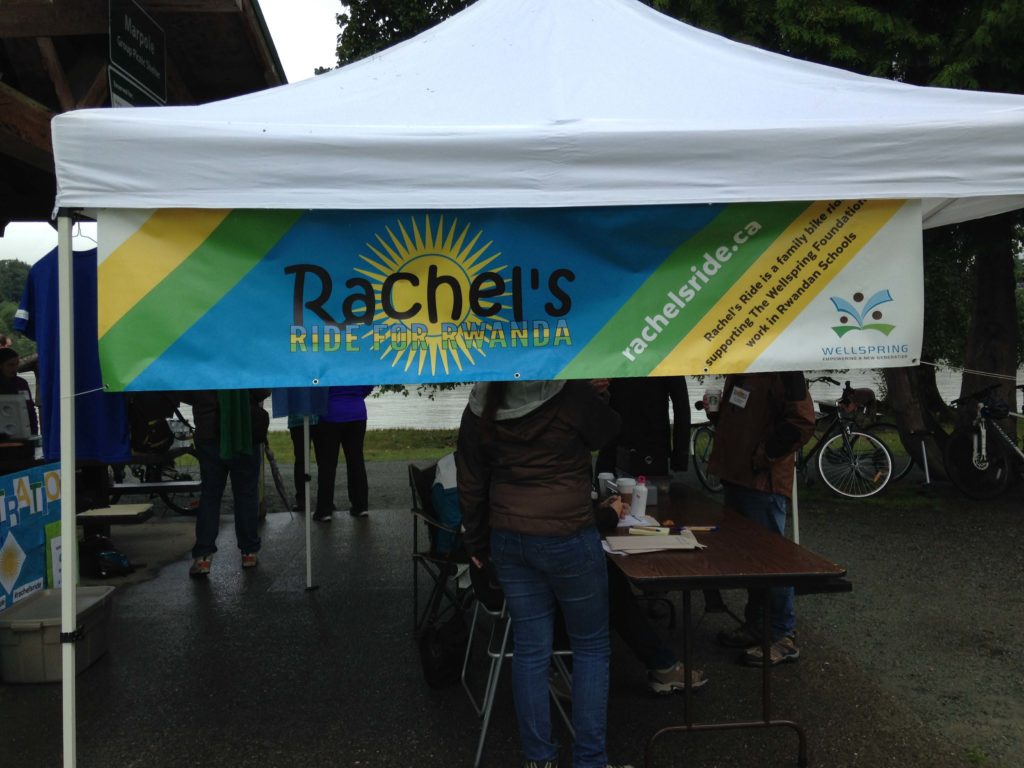My eyes opened abruptly to darkness. I checked the time, 5:30 am. Excellent, I hadn’t missed it. Hoping not to awaken my husband, l quietly pulled back the blackout curtains of our hotel room, opened the windows, and rearranged the chairs until I was satisfied that my view was just right.
White lights twinkled in the dark. As I settled into my chair, I inhaled the earthy distinctly African, moist, cool air. Hints of burnt charcoal, diesel, and dust filled my senses. Soon black faded to grey, revealing the silhouette of hills veiled in mist. Then trees and houses took shape and birds sang their morning prayers, delighting in dawn. With a set of binoculars, surely I would have been able to see the house where we had lived 5 years earlier, half way up the hill, beyond the valley.
As I watched Rwanda’s show of dawn, memories of sadness took shape and hovered over the valley, until I began weeping. A surge of pain, washed over me, as deep and potent as it felt five years ago.
I remembered awakening so many early mornings to await the sunrise. This is where God’s Presence mixed with fear, failure, and shame. This is where dreams burned, buried in ash. Tears crescendoed to sobs.
As sobs shook my body, Mark’s strong arms held my body close, while God’s strong arms held my soul close. At last the sobs subsided to stillness and pain resolved to peace.
This was not how I expected to begin, our 2018 vision trip with a team of people learning about the Wellspring Foundation for Education. I knew enough about psychology to expect to return to my pain, as I revisited the location of my unraveling. However, the very first morning? Just watching my favourite thing about living in Africa?
In preparation for the Wellspring Vision Trip, we had been urged to read When Helping Hurts, a book that explores poverty in all its forms. In the west, we focus on material poverty, and don’t think much about its other forms. The author argues that all forms of poverty result from broken relationships primarily with our Creator, ourselves, our community, and with the earth. The reader is encouraged to understand how poverty exhibits in her personal life before presuming to “help” resolve poverty beyond herself. As a result of the directed self probing, I discovered that I had a broken relationship with my work.
In my mind, I never do enough. I never focus on the right things. I compare myself to the most productive, most accomplished, most skilled people, and always come out at the bottom. The work I do has less value than the work I’m not doing, and the work other people are doing.
These are the lies that spin inside my head. And believing these lies is part of what defeated me when we lived in Kigali, Rwanda from 2010-2013.
The Mumudugudu Wy’bjirinjiro (Village of Hope) in the Gasabo district at the outskirts of Kigali is where I began teaching English to a village of fatherless children. I fought my fears of inadequacy to teach there two days per week for six weeks during the Rwandan school break. I agreed to continue afternoon lessons once the school session resumed.
However, in the meantime, my nine year old daughter experienced an emotional crisis that shook her to the core of her identity. I knew she needed me to be available everyday after school. I told those high school boys and girls that I wouldn’t be available to give English classes after all.
Several months later I became ill with sub-acute thyroiditis which spun me into anxiety, until I crashed in a heap of depression and fatigue. And there my childhood dreams to be a missionary burned; the ash buried all hope of significant service in Rwanda. My personal mission had failed.
Now, five years later, we visited schools in the same Gasabo district. We drove the familiar congested roads through town. Women in colourful dresses, and head wraps, men in dark trousers, brightly coloured satin shirts, and shiny shoes, walked briskly alongside the snake of traffic. With the urgency of a first responder, a motorcycle taxi pulled a quick u-turn directly in front of us, to pick up his next passenger with a baby strapped on her back.
Congestion let up slightly as we reached the two lane highway out of Kigali. We passed a truck belching diesel fumes. I noted the bright blue and yellow mud brick shops where men huddled to catch up on the latest news. We passed the familiar dairy with lush green pastures and the corner where the fish farms had been five years ago.
To my surprise, we turned off the highway onto the road by the tall red canalillies. The steep dirt road, so slippery in rainy season was now paved. At the top of the hill, the pavement ended, and we jounced along the dirt road. And there lay the Umudugudu Wy’bjirinjiro village nestled in trees on the hillside. A lump filled my throat, causing my eyes to leak. A few minutes further, and we disembarked from Wellspring’s white Toyota Hilux. From the fifty nine schools Wellspring works in, Mark and I just happened to be assigned to Ruhunga school, the very school that served our old friends at Mumudugudu Wy’bjirinjiro.
Our school tour began. This area was particularly decimated by the genocide of 1994. One survivor told her story, describing the nearby Ruhunga church turned crematorium – for the living!
Three years ago, when Wellspring began working here, Ruhunga School was still reeling from the horror unleashed twenty years earlier. Trauma, distrust, material poverty, and hopelessness resulted in high dropout rates, drug abuse, poor attendance and academic achievement.
But today, you wouldn’t recognize this description of Ruhunga school. We witnessed a school beautified by flowers, and a vegetable garden which supplies a school lunch program initiated by the parent group. Pride, participation and enthusiasm characterized the classes we visited. Not surprisingly, academic achievement had also improved.
Best of all, it wasn’t just adults growing leadership and problem solving skills. We had the privilege of observing a “Basket of Love” ceremony. Once each term, students collect money to purchase a hen. This hen is presented to a child selected by his/her peers, based on need. As a result, he/she can sell both eggs and chicks, helping to support the family, buy a treat now and then, and contribute to the next “Basket of Love.”
“We are seeds of Wellspring,” said the teacher representative. Wellspring trains a few select teachers, who then share what they learn with their peers. And so grows the ideology that every child has value because she is created in the image of God. The culture of servant leadership grows like a nourishing garden, every seed capable of producing an abundance of beans, carrots and cabbages. Wellspring teacher trainers have been planting seeds in school communities. These schools are now growing dignity, ownership and quality education integrated with faith. In turn, these schools share their understanding and hope with other schools.
I thought of how I’ve had the privilege of giving seed money to Wellspring. I thought of how my troubled nine year old daughter grew into an 11 year old who dreamed up Rachel’s Ride for Rwanda, a community fundraising event that has raised enough money to support a school for three years.


And I wonder, did God graciously show me a truth that had been alluding me all these years? Small work has value. Being home at the end of a school day, everyday, just because my girl needed me was the best way for me to serve my beloved Mumudugudu Wy’bjirinjiro. My dream was to teach English to a class of approximately 10 students, sharing God’s love in the process. Instead I stayed home to nurture one wounded child, who given time to heal, inspired a community to work together, raising funds to support Rwandan trainers to teach teachers, parents, and administrators – the whole Ruhunga school community.
The smaller, seemingly less significant work turned out to have much larger impact than my initial plans. God used my tears and the ashes of my dreams to nurture seeds so small, I couldn’t see them. “Those who sow in tears will reap with songs of joy. He who goes out weeping, carrying seed to sow, will return with songs of joy, carrying sheaves with him” (Psalm 126: 5-6).
READING
Psalm 18:6; Psalm 126:5-6; Matthew 13:31-32; Psalm 84 Psalm 30:11-12
PONDERING
Are there small things in your life that have more importance than you think? Why do you minimize them? How might God’s perspective differ from yours on these things?
Where are you feeling blocked? Might God be redirecting you, or inviting you to shift your perspective?
Have you been grieving a loss? Bask in God’s Presence, feeling his strong arms of love hold your soul. Hold onto the hope that joy follows grief.
WORKS CITED
Corbett, Steve. When Helping Hurts: the Small Group Experience. Moody Publishers, 2014.

8 thoughts on “Seeds”
Good day! This post could not be written any better!
Reading this post reminds me of my old room mate! He always
kept talking about this. I will forward this article to him.
Pretty sure he will have a good read. Many thanks
for sharing! http://www.atlaselectricalse.com/__media__/js/netsoltrademark.php?d=images.google.com.sa%2Furl%3Fq%3Dhttp%3A%2F%2F918.network%2Fcasino-games%2F67-lpe88-lucky-palace-casino
Thanks for your kind words. I’m glad you enjoyed “Seeds” enough to share.
Loved all of the articles as well as your story, but I especially loved this post as I got to know my dear sister-in-law a little better. I actually plan to mull the truth over some more as I strive to embrace the routine in my life with more positivity.
Your website looks so amazing: I confess I am a tiny bit jealous, but I won’t let that giant slay me! Congratulations!
Thank you Marilyn. Embrace routine. Embrace the mundane. It sounds like another blogpost idea! Embracing routine can be so difficult, especially when it doesn’t align with your dreams or expectations.
My website looks amazing because Colleen Biermann designed it!!! And you Marilyn, have been such an encouragement on this journey. Your insight and feedback has been so helpful.
Wonderful. Katherine!
Thank you, aunt Betty.
Was very emotional for me to read about this experience on your return to Rwanda.
It’s amazing when God gives us a glimpse into the eternal impact of our seeming “littleness.”
And sometimes we don’t get that glimpse, like many times on my 35 year journey with unwellness – then we continue on continuing in blind faith, trusting in God’s sovreignty, in spite of being able to barely put one foot in front of the other. Like today. . .
It’s true, I think those glimpses into eternal impact are rare gifts, because this is a faith journey? Maybe God wants us to focus on being faithful rather than impactful. And I think we underestimate God’s pleasure in our faithfulness. Your daily plod through fatigue and all the rest of it, have also had impact. You have been a consistent source of encouragement to me, a role model, and a confidant. And I’m sure I’m not the only one touched by your blind faith, and the way you live out your faith. As Audrey always said, “Keep on keeping on.”